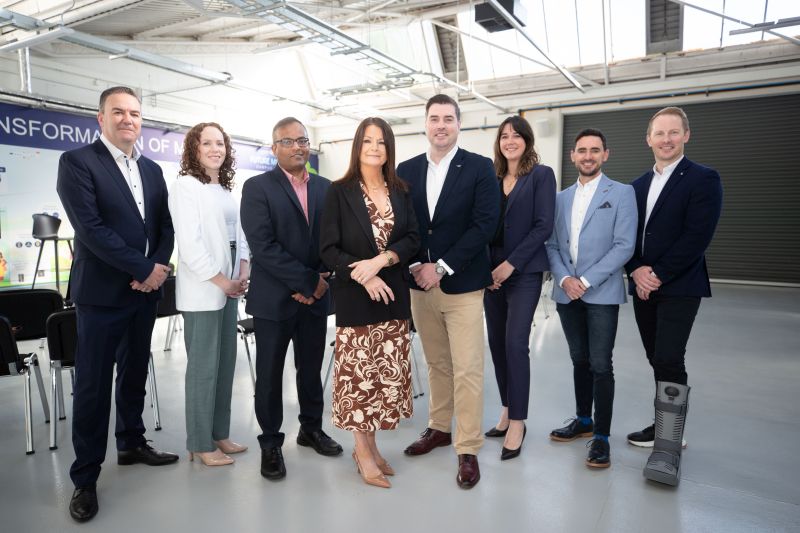
Organisational culture will change with AI …Shannon Chamber seminar hears
Helen Downes, CEO, Shannon Chamber (centre) pictured at the digitalisation and AI seminar held in Future Mobility Campus Ireland, delivered by the EY Consultancy team pictured from left: Brian Moroney, Orla Duffy, Vikram Kunnath, Maurice Foley, Megan Conway, Tim Cush and Tim Bergin. Photo by Eamon Ward.
Keenly focused on capturing trends in manufacturing and forecasting the impact that digitalisation and artificial intelligence (AI) will have on business, a team of experts from EY Consulting took to the stage in Future Mobility Campus Ireland to address a Shannon Chamber seminar to advise companies how to unlock the power of digitalisation and utilise AI for competitive advantage.
The team was led by Maurice Foley, partner, technology delivery and head of technology consulting Mid-West, and comprised Vikram Kunnath, partner, manufacturing execution systems; Tim Cush, partner, artificial intelligence and intelligent automation; Megan Conway, partner, technology consulting; Brian Moroney, partner, digital and emerging technologies; and Tim Bergin, partner, people consulting
Attendees were advised that digitalisation brings transformation challenges and opportunities that need to be navigated. Generative AI can also bring uncertainty with many companies struggling to know where to start, balancing the art of the possible to gain competitive advantage versus what regulatory and legal constraints may exist.
Vikram Kunnath said that many companies operate silos of excellence across their manufacturing and that this lack of connected systems may result in varying degrees of standards. Advocating that businesses aim for a fully connected site he said the benefits to be gained would pay for the technology investments.
“A digitally skilled and fluent workforce is the future, and it will create new revenue streams for business. People and machines will work smarter and there will be lower manual intervention.” he added.
Focusing in on trends in generative AI, Tim Cush said that sixty-five per cent of CEOs recognise the potential of A1 to drive productivity and positive outcomes for all stakeholders but recognise that they need to balance this excitement with caution, ever conscious of ethical requirements.
“Research shows that 82% of corporate leaders recognise that employees will need new skills for A1, and that initially, 76% of people will use AI for administrative tasks. They also understand that any new technology can be disruptive in the workplace but that they need to create the energy to encourage its adoption acknowledging that AI can deliver benefits across all functions.
“Companies need to understand where to start and ask if their business and operating model is ready for AI,” he added.
Topics discussed in a lively panel discussion which followed the main presentations included the ethics of AI, a requirement going forward for at least forty per cent of the workforce to have skills in digital transformation, and the psychological impact of merging with technology.
As Shannon Chamber CEO Helen Downes said after the event: “Technology and data are becoming more critical to a company’s success which, as stated at the seminar, will generate a requirement for a new chief digital and transformation officer role within organisations. Employees will have to upskill, driven internally at company level as well as allocating time to self-learning to a level where they are not regarded as passive resistors to change. The future will be different, but exciting,” she added.
